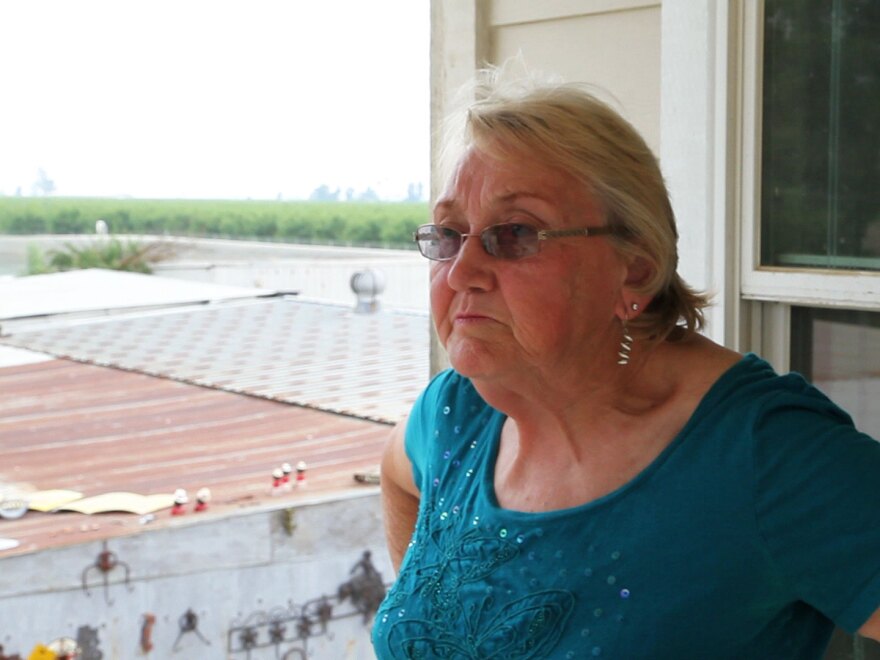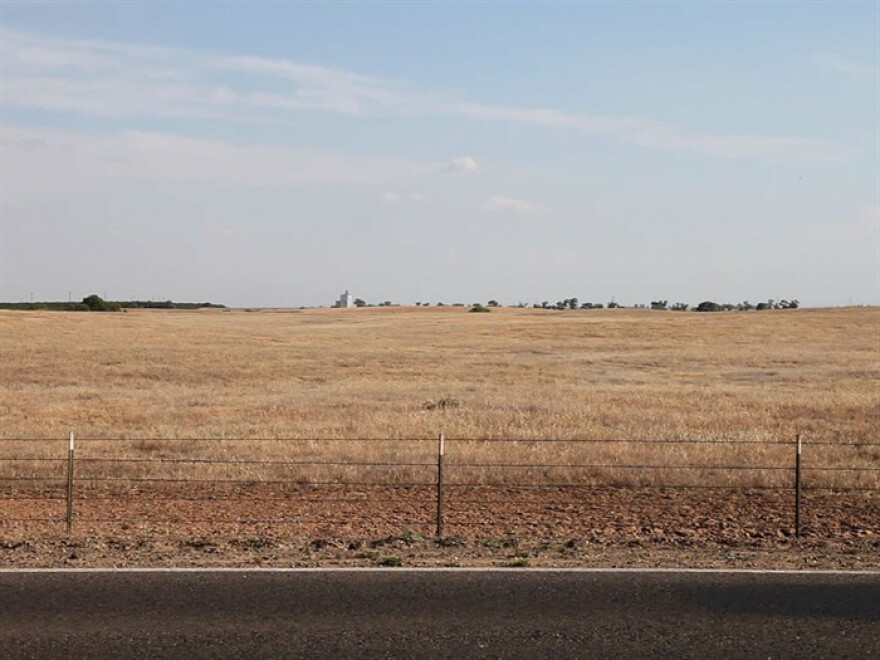The California drought is becoming a source of tension between homeowners and farmers in the Southern Central Valley. Farmers are seeing unprecedented reductions in their allotments to surface water. Homeowners are watching their private wells run dry. Pauline Bartolone has more about how people in the Fresno area are tapping into underground water.
The home where Ruth Griffin planned to retire looks like it’s an island in a sea of almond orchards.
Griffin: “Well it’s trees everywhere, which is great, except when they’re having to water day and night.”
"We'll have to get water somehow, even if we have to truck it in." - Ruth Griffin
Griffin’s brand new house is in the heart of California farm country. It’s outside a town called Kingsburg, just south of Fresno.
Griffin: "I’ve lived here all my life, I’ll be 70 next month. And I have two children and I’ve spent my life savings to build this home and now we can’t use it.”
About a month before she planned a move into her new home, her well went dry. Now, when she opens her bathroom faucet, nothing comes out.
Griffin: “See… nothing in the well, nothing in the tank… sigh.”
Griffin will have to spend at least $17,000 to drill a deeper well that will reach the underground water table. She’s on an 8-month waiting list.
Griffin: “We’ll have to get water somehow, even if we have to truck it in.”
Griffin says the water problems may be from drought – but she also blames the farmers next door. From the second floor of her house, she has a clear view of a swimming pool size basin of fresh water on the farmer’s property. She says they pump it from the aquifer, a shared underground pool of water.
Griffin: “It kind of irritates you a little bit to see all that water over there and I see my neighbors, they have 10 dogs and I see them swimming in the pond.” Reporter: “But you can’t access it?” Griffin: “I can’t access it at all, uh uh.”
State studies show groundwater levels in the area are 100 feet below the historic low.
Ruiz: “Usually when people are on a private well, it’s sort of a pioneer spirit of self-sufficiency, an attitude of self-sufficiency.”

Sue Ruiz is with an organization called Self Help Enterprises. She’s a resource for people in the San Joaquin Valley when their well runs dry. In her small town of Easton, she estimates more than half of private wells owners will have dry wells within a few years. She says investing to drill deeper is easier for some than others. In the meantime, Ruiz says, homeowners adjust.
Ruiz: “If you’re lucky enough to live in a community, you put a hose next to your neighbors if your neighbor happens to have water, and so you can live off a hose for a while, a garden hose…Just be conservative with the water and survive.”
Farmers say homeowners are not the only ones having a hard time during this drought. California Farm Bureau President Paul Wenger.
Wenger: “They're part of the problem too, because they’re there. And their demands have to be met, people want drinking water. Well that farmer, if he doesn't have water, his crop dries up.”
Wenger he’s never seen such severe affects California agriculture, not because this is the driest year, but because of the unprecedented cut backs on surface water. He says that’s why groundwater is being overdrawn in some places. In other regions, farmers are relying completely on ground water.
Wenger: “What would the Central Valley look like today if there weren't agriculture. There would be tumbleweeds. Not even jack rabbits.”
Wenger says homeowners just have to drill deeper. It’s a drought-induced scramble with farmers and homeowners as competitors.
Wenger: “Nothing's an even playing field. Ever. And so, that's why you have to think about when some people built their home or they bought their home, it is still buyer beware.”
But Peter Gleick with the Pacific Institute says the problem is the lack of state water management.

We don’t manage and control our groundwater in a sustainable way, and especially during a drought when there’s not a lot of surface water people start to pump and over-pump groundwater. It’s a tragedy of the commons.
He says California is one of the only states in the country that doesn’t comprehensive groundwater policy.
Gleick: “If you don’t know how much groundwater is being pumped or how much you’re taking or how much your neighbors are taking, it makes it hard to control it, and that’s to the advantage of some people, and to the disadvantage of others.”
The state is working on a groundwater management plan right now. But any actions will be taken over the next five years.
https://www.youtube.com/watch?v=P4PlfsckbSM&list=UUJHvzSXrfJYljOJlnDTzxxQ
https://www.youtube.com/watch?v=6OMcnPlgM3w&list=UUJHvzSXrfJYljOJlnDTzxxQ





